I spend much of my time coaching product leaders: folks who manage teams of product managers and developer+designer+product teams. I also step into companies as an interim VP Product Management. So I have strongly held personal opinions about what’s on the minds of other product leaders. But (like all of us) I’m at risk for recency bias and juicy anecdotes. Semi-quantitative data keeps me more honest.
To find out what other product leaders are worried about, I fielded a short survey between 21-Nov-18 and 7-Dec-18. It asked open-ended questions about their concerns, then for a ranking of ten pre-selected issues. 120 product leaders responded. Here’s what I learned:
Among 380 free-form responses about major issues or concerns:
- 35% of comments were about figuring out what problems to solve and building the right thing: validation, good market input, product/market fit, innovation, and outcomes instead of output. This was three times more frequent than any other topic and highlights the product management leadership shift from delivery janitors to value creators.
- 11% called out training, mentoring, and skilling-up of product managers. Scaling teams, getting product teams to talk with end customers, and leadership skills came up a lot.
- 10% of the comments were about managing product portfolios, trade-offs/priorities, and balancing single-customer projects against core product improvements. Multiple stakeholders, inevitably scarce resources and lack of focus were cited.
- 8% identified issues of authority and ability to set product direction. “CEO” and “executive team” and “senior stakeholders” appeared prominently as the people who call the shots.
Like any open-ended survey question, this was a mixed bag. You can poke through the responses here.
Then respondents rated ten of my own top concerns, scoring them along a range from “Don’t worry much about it” to “Top issue.” Assigning these to a 4-point scale let me sort for seriousness:
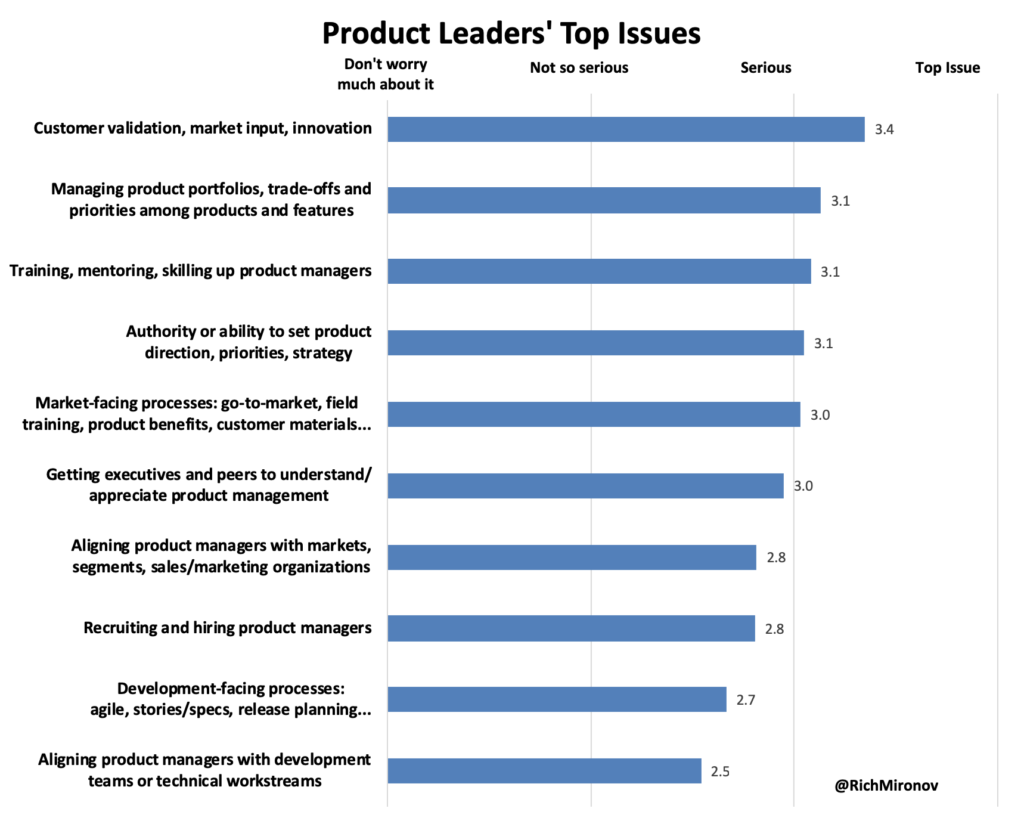
Echoing their freeform responses, the top ranked issue for product leaders was validation and market input: “building the right thing.” We want the best for our users and buyers, and better validation increases our likelihood of building what matters most. (See Melissa Perri’s excellent new book, “The Build Trap.”) Convincing other executives that good validation is worth the time is an ongoing battle, though. (See John Cutler’s latest post.)
A statistically significant step lower was the challenge of trade-offs across products, and among features within a product. Most product leaders are responsible for an assortment of assets, each assigned to an individual product manager, so allocating resources or cross-functional attention is a struggle. We want to love all of our children equally, and give each everything they need, but we can’t. Making hard choices and setting clear priorities among products/ projects/ initiatives is essential to getting (any) good work done.
Right behind that was training, mentoring and skilling up product managers. Product leaders struggle to hire folks with actual product management experience, since the candidate pool for veterans is so thin. Many of the alternate strategies mostly fail, though, in my opinion: hiring first-timers (but without ongoing coaching/mentoring to nurture their product thinking in real-world situations); choosing subject matter experts or former customers (who trust their unique personal experience over broad market feedback); or equating classroom certificates with demonstrated skills.
And lots of serious concern among product leaders around the authority to set product direction. My own work focuses here: making the case with executives that having lots of good ideas isn’t enough. Instead, intellectually honest validation and consistent prioritization (both led by the product team) are essential to delivering what large numbers of customers want to pay for. I see product leaders continually having to “sell” that their folks can deliver excellent market insights and thoughtful roadmaps/sequencing — so that other execs don’t create weekly chaos based on the most recent customer meeting or biz-speak panacea. That’s closely tied to item #6, getting executives and peers to understand/appreciate what product managers do.
Worth noting that the two issues ranking lowest were aligning product managers with development teams and development-facing product processes around agile, stories/specs and release planning. New product managers spend most of their energy here — learning how to get features defined and software shipped — in the sprint-level execution cycle. Product leaders can uplevel their strategic concern to building the right stuff, especially if they have strong partnerships with Engineering.
Does Size Matter?
Our survey captured company size tiers and each leader’s total number of reports.
| Company Size (Employees) | Responses | "How many people report to you, or to people who report to you?" | "How many are product managers, product owners or business analysts?" |
|---|---|---|---|
| 1-10 | 4 | 4.1 | 1.8 |
| 11-50 | 13 | 10.7 | 2.0 |
| 51-250 | 37 | 9.1 | 3.8 |
| 251-1000 | 31 | 14.8 | 6.1 |
| > 1000 | 35 | 27.3 | 8.2 |
| Total | 120 | 15.9 | 5.4 |
We see that product leaders at the smallest companies have the fewest product managers and total staff. (No surprise.) Worth noting, though, that numbers of product managers increases very slowly: 100x larger companies reported only 5x as many product folks. (Could be a surveying artifact.)
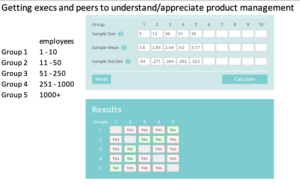
But I also got some statistical help on whether small company product leaders had different responses than big company leaders. Turns out that product heads at startups (1-10 people) reported significantly higher urgency on almost every item, with the biggest lifts around development processes (+0.9), getting executives to understand product management and market-facing processes (both +0.6) but much lower on training/mentoring (-0.7) and recruiting (-0.6). Looks like experienced product managers want to work at startups even though their product-market fit challenges are especially steep.
Takeaways
For me, these responses echo a decades-long product management shift from technically focused feature factories to customer value and product-market fit. We need to deeply understand and communicate our audience’s real needs through a mix of qualitative/quantitative approaches. Addressing actual pain with revenue-producing solutions gets us a seat at the big kids’ table.
Raw Data
For transparency, here are my anonymized survey assets. Feel free to run your own analysis and reach alternate conclusions by downloading the free-form comments, ranked issues and t test statistics per question.
Original survey:
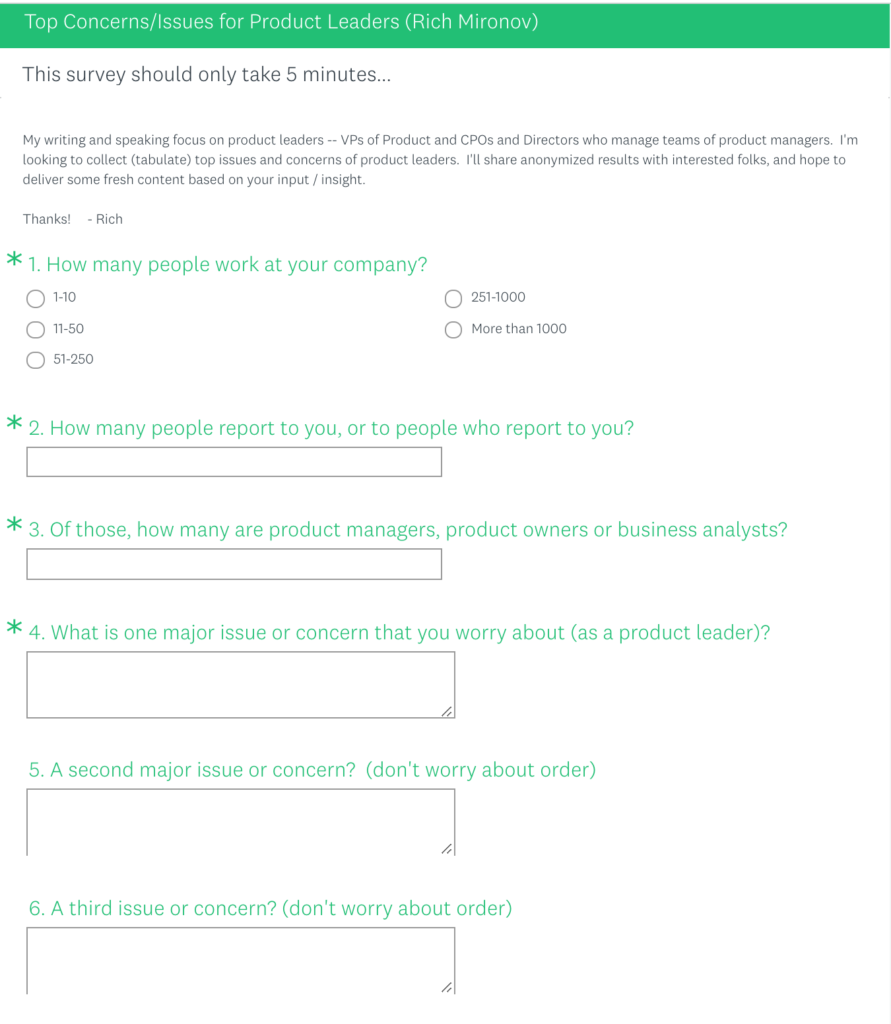
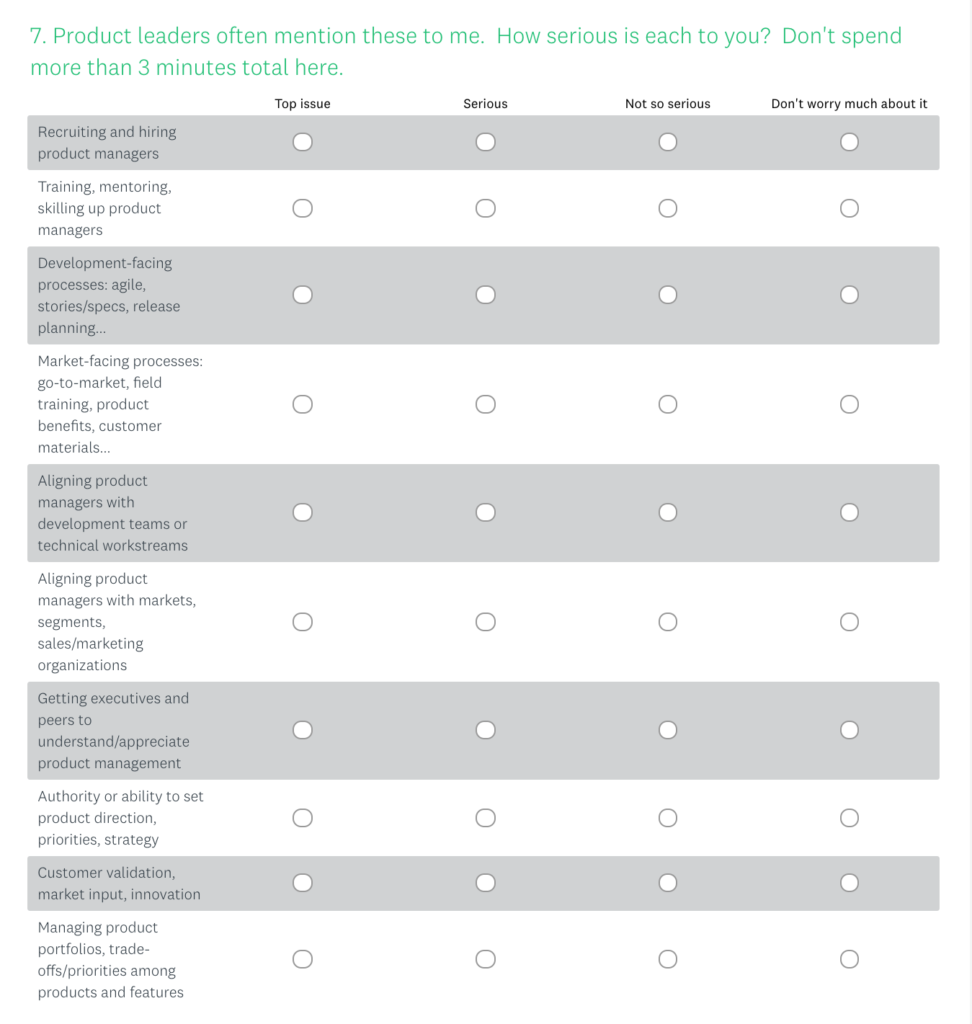
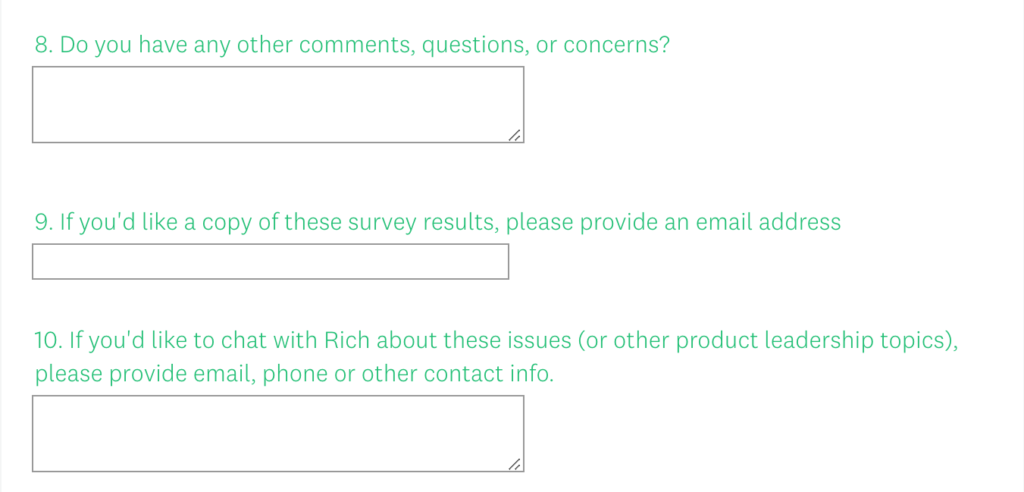
Thanks to Linda Sikora, who ran statistical significance tests for me, via the Clearworks market research team. And survey debug help from Lisa Winter, James Mayes, Jeffrey Fortin and Matt Sifferlen.

